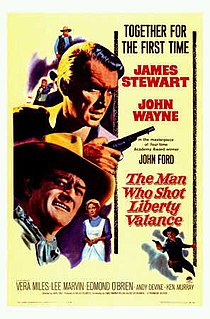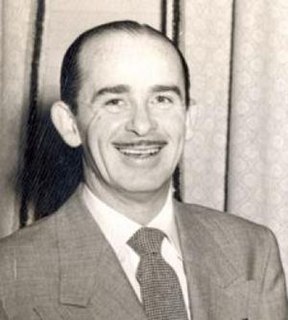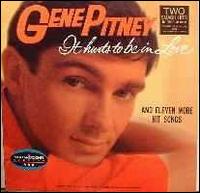This page is based on this
Wikipedia article Text is available under the
CC BY-SA 4.0 license; additional terms may apply.
Images, videos and audio are available under their respective licenses.

The Man Who Shot Liberty Valance is a 1962 American Western film directed by John Ford starring James Stewart and John Wayne. The black-and-white film was released by Paramount Pictures. The screenplay by James Warner Bellah and Willis Goldbeck was adapted from a short story written by Dorothy M. Johnson. The supporting cast features Vera Miles, Lee Marvin, Edmond O'Brien, Andy Devine, John Carradine, Woody Strode, Strother Martin, and Lee Van Cleef.

Ned Washington was an American lyricist born in Scranton, Pennsylvania.

Barry Mann is an American songwriter, and part of a successful songwriting partnership with his wife, Cynthia Weil.

"Something's Gotten Hold of My Heart" is a song written by Roger Greenaway and Roger Cook.
"Skyline Pigeon" is a ballad by Elton John with lyrics by Bernie Taupin. It is the eighth track on his first album, Empty Sky. It was originally released in August 1968 as a single on the Pye label by Guy Darrell and simultaneously by Roger James Cooke on Columbia Records. It was also recorded by Deep Feeling in 1970, Dana, Judith Durham, and Gene Pitney on his Pitney '75 album.

"He's a Rebel" is a song written by Gene Pitney that was originally recorded by the girl group the Blossoms. Produced by Phil Spector, their version was issued as a single credited to the Crystals, which topped the Billboard Hot 100 chart in November 1962. It was Spector's first number one hit since "To Know Him Is to Love Him" (1958).

"What the World Needs Now Is Love" is a 1965 popular song with lyrics by Hal David and music composed by Burt Bacharach. First recorded and made popular by Jackie DeShannon, it was released on April 15, 1965, on the Imperial label after a release on sister label Liberty records the previous month was canceled. It peaked at number seven on the US Hot 100 in July of that year. In Canada, the song reached number one.
Vanda & Young were a songwriting/producing duo composed of Harry Vanda and George Young. They performed as members of 1960s Australian rock group The Easybeats where Vanda was their lead guitarist and backing singer and Young was their rhythm guitarist and backing singer. Vanda & Young co-wrote most of The Easybeats later hits including their international hit "Friday on My Mind" and they were the record producers for the group from 1967. Young was the older brother of Malcolm and Angus Young of the hard rock band AC/DC, being the record producer behind several of the band's biggest albums.
Paul Hampton is an American actor, singer, lyricist and writer. He is listed as one of one hundred major architects of American rock and roll in the British rock journal "Footsoldiers and Kings." While he was a sophomore at Dartmouth College, he was signed to Columbia Records and Columbia Pictures at the same time to write music with Hal David and Burt Bacharach. In 1960, with Bacharach he co-composed and performed the strange death disc "Two Hour Honeymoon". After this initial outing he co-wrote hits for Don Gibson, Gene Pitney, Johnny Tillotson and hits for overseas artists Also he wrote the theme for "My Mother the Car" and sang it under the group name Albuquerque. He made two albums, "Beautiful Beginnings" and "Rest Home For Children."
"Twenty Four Hours from Tulsa" is a song written by Burt Bacharach and Hal David, about a traveling man who detours to a romance in a motel and ends up never returning home, which was a hit for Gene Pitney. Its success in the UK, peaking at #5, enabled Pitney to become an international star. In the US, Pitney peaked at #17 on the 7 December 1963 Hot 100 and #2 on the 6 December 1963 WLS Silver Dollar Survey.
"Town Without Pity" is a song written by composer Dimitri Tiomkin and lyricist Ned Washington. The track, produced by Aaron Schroeder, was originally recorded by Gene Pitney for the 1961 film of the same title. In 1962, the song received a Golden Globe award for "Best Motion Picture Song," and was nominated for an Academy Award for "Best Music, Original Song".

Blue Gene is American singer Gene Pitney's fifth album, released on the Musicor label in 1963. The album contained the Burt Bacharach and Hal David hit "Twenty Four Hours from Tulsa", a top 10 hit in the United Kingdom, Canada and Australia and a top 20 hit on the US Billboard Hot 100 (#17), as well as the minor hit "Yesterday's Hero" (#64).

It Hurts to Be in Love and Eleven More Hit Songs is American singer Gene Pitney's ninth album, released on the Musicor label in the United States in 1964. The album was released as I'm Gonna Be Strong on the Stateside label in the United Kingdom.
"Looking Through the Eyes of Love" is a song written and composed by Barry Mann and Cynthia Weil. It first became a popular hit in 1965 by Gene Pitney. In 1972, The Partridge Family recorded a hit cover version of their own.

"Standing in the Rain" is a disco song recorded by Australian pop singer John Paul Young. It was released in Europe in February 1977 and in Australia in December 1977 as the third and final single from Young's third studio album, J.P.Y. (1976). The song was written by George Young and Harry Vanda.











